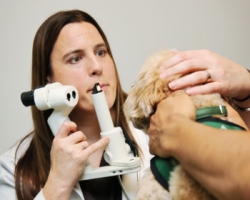
Service dogs are amazing to me. I was fortunate enough to meet the entire 2010 graduating class from Guide Dogs for the Blind. The graduates include a therapy dog that helps kids with cancer, a few bomb-sniffing police dogs and a dog that helps teach kids to read. Who knew dogs did so much more than just be a best friend?
Keeping dogs healthy is important, but dogs with jobs need to stay in top shape and that includes being able to see properly. I recently found Eye Care for Animals (ECFA), whose mission to keep these special dogs healthy. ECFA is dedicated to providing the finest in veterinary ophthalmology services. Their staff of board-certified ophthalmologists and clinical specialists have more than 200 years of combined experience and provide the highest level of care, education and understanding to their clients and companions. They are continually innovating and exploring new technologies to provide the latest in veterinary ophthalmology care.
Huxley and his owner Elizabeth Kendrick are an amazing team. Huxley is a therapy dog certified with the Delta Society and visits hospitalized children with cancer. Imagine the joy on their faces when this little dog makes a social call. Not only has he been working for the last three years, but he completed his classes with honors. Kendrick recently noticed that Huxley was running into things a little like the cartoon character Mr. Magoo, so she thought it was time to visit the eye doctor.
Dr. Christine Fahrer, located in Culver City at City of Angels, has been an eye specialist for nine years. While in college she had a cat with eye problems. She said, “He was the love of my life. I hadn’t even been to veterinary school yet. He started having eye problems when I was in my masters program. That’s what got me interested in becoming a vet.”
Fahrer performed a very extensive exam. Huxley behaved like a good boy. He wasn’t bothered by any of the equipment or bright lights shone into his eyes. Fahrer asked Kendrick questions. I was amazed by the outcome of his exam. His eyes, it turned out, are perfectly fine. But there is a problem. Sadly, Kendrick’s husband, Sean Corrigan, died in July. Ironically, he had cancer and was Huxley’s number-one patient. Huxley sat by his side every minute, bringing him comfort.
“The only time Huxley would leave my husband’s bed was to go get a drink or go to the bathroom,” Kendrick shared with me. “I’d see him trot out of the bedroom and go to his doggie door. He’d attend to his business but would rush back to sit by Sean’s side.”
It seems Huxley’s eye problems began shortly after Sean’s death and the doctor felt it was a behavior that stemmed from his sadness.
Many canine eye problems can be easily prevented with light maintenance and care. Use a clean, damp cloth once a day to wipe away the buildup of gunk around a dog’s eyes. It can help prevent irritations and infections. Be careful to not rub, poke or scratch the actual eye.
Also, be sure to keep the hair around the eyes short and well-kept. The hair could begin to poke or scratch the eyes. Sometimes the hair can prevent the proper disposal of some of that eye buildup. If trimming the hair, always do it in a downward direction; never have the tip of the scissors pointed toward a pooch’s eye. Even a calm dog could suddenly move, leading to a serious eye injury.
Dogs get cataracts just like humans. Cataracts in dogs are essentially the same as they are in people: The lens becomes cloudy and opaque, which can significantly hamper vision and lead to blindness in severe cases. Another serious eye problem for dogs is glaucoma. Increased pressure causes the eye to stretch and enlarge, which may cause blindness later on. Glaucoma is an inheritable disease and is common for only a few dog breeds like cocker spaniels, chow chows and Labrador retrievers.
The National Service Dog Eye Exam event is hosted annually by the American College of Veterinary Ophthalmologists. More than 190 board-certified veterinary ophthalmologists donate their services to provide eye exams to registered service animals across America, at no cost to the guardian. Through these efforts, the health of thousands of service animals can be improved and potential disease prevented.
Keep abreast of a dog’s normal behaviors and if anything out of the ordinary occurs, be sure to take them to a veterinarian for a check up. Eyes are important, whether they are helping do a job, bringing joy to kids with cancer or just looking for treats.
Lori Fusaro has been voted the best portrait photographer by FoxTV three years in a row. She lives in Culver City with her husband, four cats and dog. Contact her at Lori@FusaroPhotography.com or FusaroPhotography.com.
